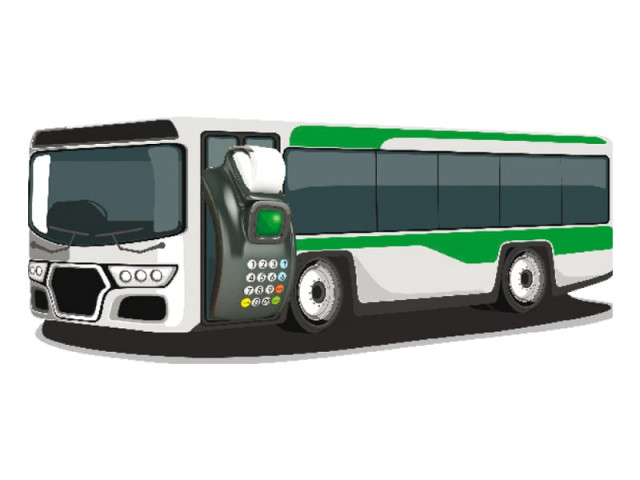New e-ticketing system for Lahore buses ready for test run
Handheld devices to raise revenue by improving efficiency.

A passenger getting on the bus will tell the conductor her destination. The conductor will type it into the handheld device, which will give a ticket printout for the passenger. ILLUSTRATION MAHA HAIDER
The Lahore Transport Company (LTC) is to give a handheld device for issuing bus tickets a weeklong trial run with a view to putting one on each bus operating in the city.
The e-ticketing pilot project will be launched on an Albayrak bus on the B-28 route (Airport to Valencia Town) in a few days, LTC officials told The Express Tribune.
A passenger getting on the bus will tell the conductor her destination. The conductor will type it into the handheld device, which will give a ticket printout for the passenger.
The device will be equipped with WiFi, GPRS and GPS, so it can send real time data on number of passengers to a central computer equipped with software to keep track of numbers and do comparative studies. The main data centre can also monitor the movement of the buses through a GPS device installed in the buses.
According to the LTC, some 20 per cent of revenue is lost due to conductors’ negligence.

LTC IT Manager Badieur Rehman told The Express Tribune that the e-ticketing project would address this problem as the exact number of passengers would be known. The devices would raise revenue, he said.
The handheld devices would also prevent the conductors from overcharging passengers, he said. If the test run is successful, the devices would be introduced on all buses.
A private company is providing the handheld device and software for the pilot project. The device, according to the company’s officials, costs around Rs70,000.
The last experiment in the city with handheld devices was a failure.
A private company introduced them at two parking areas to issue parking tickets. But, according to company officials, the devices had connectivity problems and printing faults so they often failed to print out tickets. The fee collectors then had to resort back to issuing manual tickets.
Other plans
Subject to approval, the LTC also has plans to install LED displays at bus stops that would show the expected arrival time of the next bus, similar to stops on the Metro Bus route, as well as to install digital video cameras on buses which will analyse the number of passengers by counting heads.
The LTC is currently conducting a survey on various routes to assess the workability of the e-ticketing project and whether more buses are needed on the routes. The city has 54 official routes for high-occupancy vehicles, of which 34 are operational. Companies like Albayrak, Foton Busco, Platform, Pak-Oz, Pak-Kor and others run more than 350 buses in Lahore.
Published in The Express Tribune, May 29th, 2013.



















COMMENTS
Comments are moderated and generally will be posted if they are on-topic and not abusive.
For more information, please see our Comments FAQ